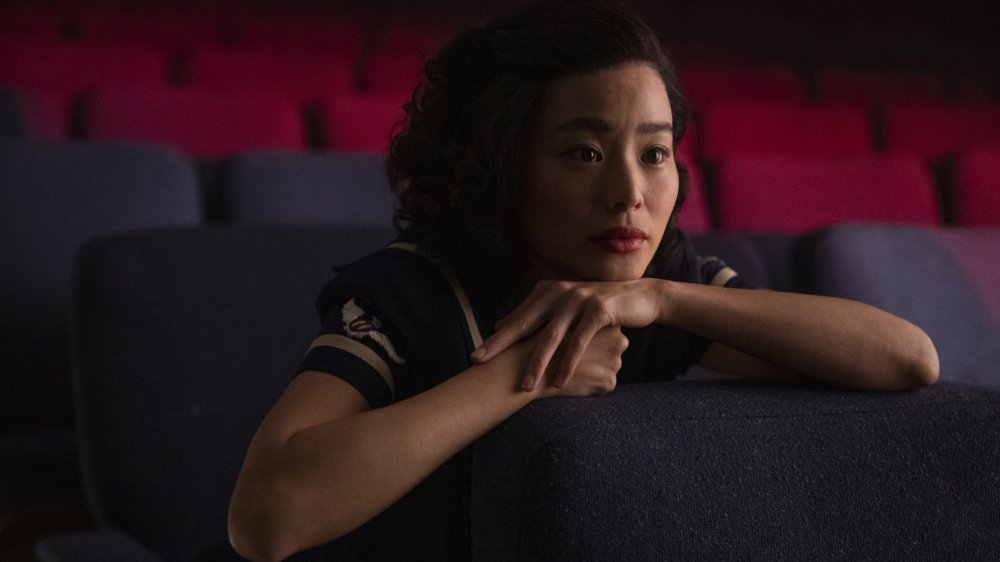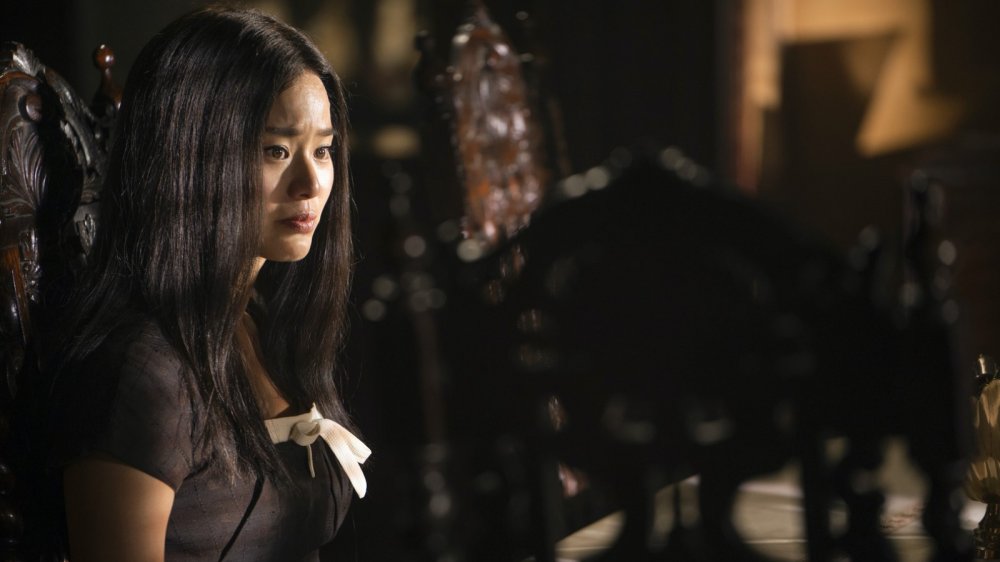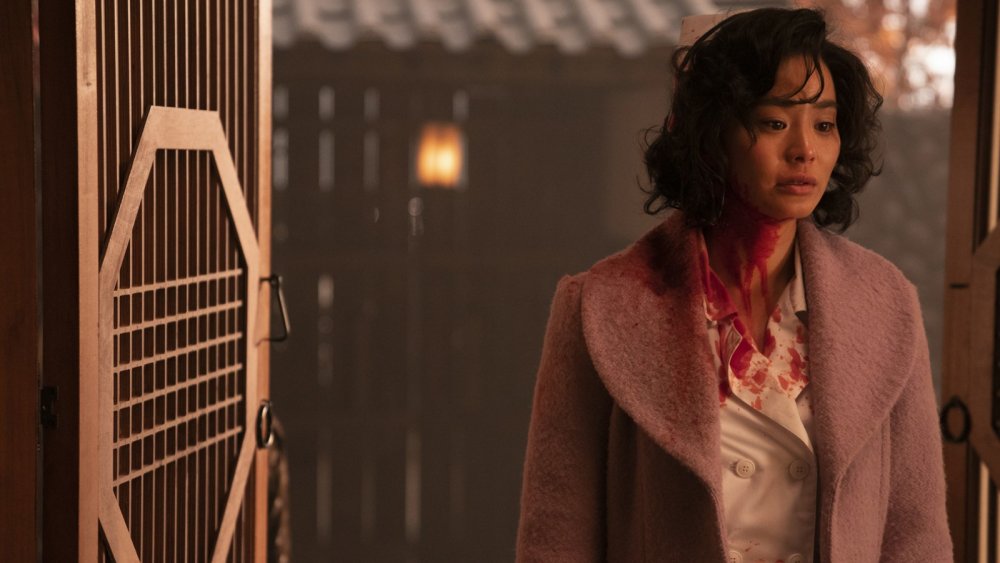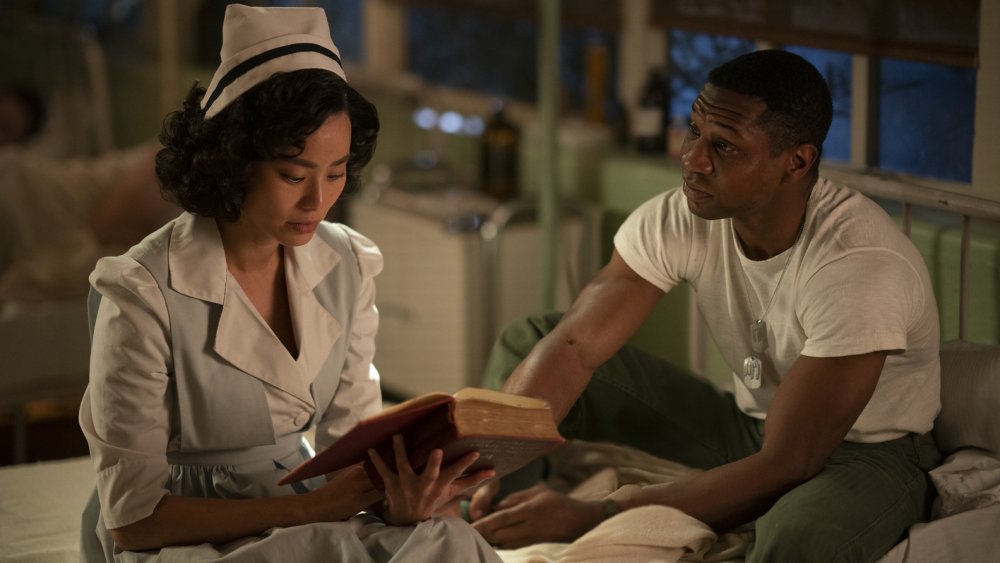Jamie Chung Talks Lovecraft Country Season 1 - Exclusive Interview
Jamie Chung has come a long way since she first appeared in the 2004 season of MTV's The Real World: San Diego. Within a few years after her season of the hit reality series concluded, the Korean-American girl next door quickly became a rising television star, landing small parts in popular shows like Veronica Mars, ER, and CSI: NY. She even scored a recurring stint as Cordy Han in the daytime drama Days of Our Lives.
Chung's other notable television credits include appearances on Castle and Grey's Anatomy, but this was only the beginning of her bustling career. By 2009, she catapulted from the small screen to the big screen when she co-starred alongside Carrie Fisher (Star Wars) in the theatrically released slasher flick Sorority Row. From there she'd go on to appear in major Hollywood blockbusters like The Hangover Part II and The Hangover Part III, as well as Zack Snyder's Sucker Punch and Frank Miller's Sin City: A Dame to Kill For. She was also the voice behind Go Go in Disney's Big Hero Six. Speaking of Disney, she also got to put her own stamp on a beloved princess when she played Mulan in ABC's Once Upon a Time, a character she fell in love with back when the original animated movie was released in 1998 (more on that later).
But perhaps her most daring and outlandish role to date, and a polar opposite when compared to her Disney roles, would be HBO's Lovecraft Country. In it, she plays Ji-Ah, a seemingly demure Korean war nurse who carries a dark, mythical secret. She's basically a human vessel for a nine-tailed fox spirit also known as a Kumiho. These Kumihos thrive on devouring the souls of men — and the screwed-up part is that soul-munching time only occurs during sex. Think of her as a succubus or a female praying mantis who gets hungry for the blood of her mate during sexy time — you get the picture.
Lovecraft Country's lead hero Atticus (Jonathan Majors) falls in love with Ji-Ah, and lucky for him, Kumihos can have feelings too. Ji-Ah manages to suppress her worst animalistic impulses during her steamy moments with Atticus, but not without absorbing some of his memories as well as a glimpse into his future. Because of this, Ji-Ah is armed with crucial knowledge that may very well aid Atticus in his final battle with evil. In Lovecraft Country's season one finale, Ji-Ah had a crucial role to play, and in Looper's exclusive chat with Chung, she offered some tasty little morsels about her time on set. Here, she talks about why Ji-Ah is truly a rare type of role for Asian actors, her thoughts on how Lovecraft Country tackles relevant issues such as racism, and all the bloody details behind those bizarre sex scenes.
Lovecraft Country shines a light on horrific true events
What was your first impression of the Lovecraft Country script when it was handed to you? This series boldly tackles racism, so I was wondering what jumped out at you most.
I think what jumped out is the specificity of certain historical events. What I love about every episode is there's a lesson of what happened in our history and how we treated people of color in the United States. Even though our show is set in a horror genre, it really shines a light on the horrific true events that occurred to people of color in this country. Those are the stories that are being shared and woven into Lovecraft Country.
For our episode, you learn about the segregated troops. You learn about how Asian Americans and African Americans are treated in this country, how they're sent off to fight a war only to come home to a segregated America and treated like second class citizens, if not criminals. You learn about how the system was put in place to keep the people down, and how that still is an issue today. So even though it's set in the 1950s, there's still issues that are relevant today, which unfortunately reflects our current society.
For me, one of the most bizarre and outlandish moments in the "Meet Me in Daegu" is that bloody sex scene. It's just way out there. It kind of reminded me of nature and how, with praying mantises in particular, the females will often kill and eat the male after mating.
It's very animalistic, right? What I like about what Misha Green's interpretation of a nine-tailed fox spirit is — it's very literal. You have nine tails, two from the eyes, two from the nose, two from the ears, and two from down there. And you have those tails that penetrate their victims and, quite frankly, suck out their souls and their memory. And then once it's done, it just rips them apart. It's animalistic and it's horrific, but then it also plays on the true horrors of the Korean War. How there was civil unrest, how there were Koreans that were pitted against each other and killed each other for communism or anti-communism. And then you have the horrors of what war's really like and how civilians are killed. I mean, I love that our episode didn't shy away from any of those horrors.
From a practical effects angle, how was it shooting those scenes? I know there's some CGI that got added later, but I just imagine these male actors suspended with wires, and then there's so much blood. Was there a really elaborate setup?
No, it was a very practical gag. We had balloons filled with blood. They were hoisted above me. They used chicken wire like a crate, to hold it up. And then special effects, it was rigged and wired so that when you press the button, it would all have split at the same time, so it gives that pop effect, which is what they wanted. But it was all very practical. We did it just in one take, thank God. And then for the rest of the gory scenes of the mom cleaning up the blood, that was all done on the same day, on the same set.
Jamie Chung worked with a dialect coach for six months
You've done your fair share of fight choreography before, because you played Blink in The Gifted, and Miho in Sin City: A Dame to Kill For. Did that help prepare you for dance choreography? You have that scene where you channel Judy Garland, so I'm just wondering how you prepped for that dance sequence.
I mean, listen, I've never been a part of a show where I had all the support that I needed. I was like, "Guys, I need dance classes." "Here you go. Here's dance lessons to work on the choreography." "I need singing lessons, I'm singing. I should get some singing lessons." I got singing lessons. I had a dialect coach for six months prior to shooting our episode. Our episode took a month and a half to film. Really, we were given all the resources from this production that we needed in order to make the episode that we made.
And it's so rare that Asian American women get these kinds of roles to play. And in fact, being in the industry for over 10 years, I've never had an opportunity like this, or never did I read of an opportunity like this. Let alone get to play one. So I'm just so honored and so grateful that I got to live through this character arc of Ji-Ah. I mean, there's so much going on in this episode: love, loss, and revenge. And the first time she falls in love, the first time she meets her best friend, thinking from a perspective of 90 souls, 90 men, that she has absorbed, and only having their perspective. And then learning how to be a woman through Judy Garland movies. It's just layers upon layers of so much meat that you can sink your teeth into as an actor. This is unreal. I've never had an opportunity like this.
You mentioned a dialect coach. There's a lot of Korean dialogue in this episode. Did you have a hand in improvising the script, or help in making the dialogue seem more natural for the screen?
I am Korean American—my first language was English and my parents, they immigrated in the '80s and their primary language is Korean, and they don't speak a lot of English — I mean, I can speak Korean to them, but it's very casual and very simple and conversational. I know how to read and write in Korean, but I've never had to apply that to a role. And so, yes, I was given a dialect coach, a wonderful Korean teacher from Atlanta and she helped me through all of it. But as for the dialogue — It was all of Misha's words, and then my teacher would have to directly translate it, and then present it to Misha, and then she was like, "But this is what really makes sense," because sometimes there's not a direct translation. And so it was really a lot of work between Misha and my brilliant dialect coach. But I personally did not have a creative hand in it because I was more concentrating on learning the Korean, and owning it, and embodying this character.
The love triangle between Ji-Ah, Leti, and Atticus
Your character Ji-Ah is very inspired by Judy Garland she has a love for old Hollywood movies. Are there any old Hollywood actors, or actors from your childhood who inspire you in that same way in real life?
You know, what's so funny is I didn't watch a lot of musicals growing up. I had to watch a lot of Judy Garland movies to prepare for this role. But growing up, I watched a lot of Audrey Hepburn movies. My mom was a big fan of Audrey Hepburn. My mom didn't idolize her, but dressed like her and loved her movies, and so that's kind of what I've gravitated towards the most, but they're all kind of from the same era, which is really cool.
Ji-Ah has a special connection with Atticus. They're both passionate about literature, and they both came to understand each other more when they realized that they had similar upbringings. Both of their parents are trying to mold them into something they are not. But Atticus now has this relationship with Leti, and that's strong too because they have their childhood bond and they both just went through traumatic events together. I'm just wondering, in your opinion, who do you think is the better romantic match for Atticus?
Ooh, I don't know. I mean, what they've shared in Korea was really quite special, but then it also ended in such an abrupt way. What's interesting is, I do think that now that we've set up this love triangle, you will see that play out. You will see that come to a head and be confronted. But the whole time Atticus is running away from his past, and sometimes it's better not to live in the past. So I personally, without giving anything away, I think that it's more suited for Leti and Atticus to be a couple than Ji-Ah and Atticus.
You've played roles before where the torch was passed on to you. For example, Miho was played by Devon Aoki in the original Sin City, and then you got to put your stamp on that character in the sequel. And then on the flip side you got to play Mulan in Once Upon a Time, and now there's this new live-action movie starring Yifei Liu, and now she gets to play the character. I'm just wondering if you had a chance to watch it yet and what you thought of this new iteration of the character?
No, not yet. I can't wait. It actually released when I was on a road trip, because my husband and I drove from New York back to L.A. And so I, kid you not, just got back into L.A. late last night, so I haven't had a chance to watch it, but it is so high on my list. Because that's an original folklore, and I fell in love with the animation, and I was able to play a different version of that character. Ours was never the origin story in Once Upon a Time, this was long after how she first became a warrior, and now she's in this fantasy world. So it was very, very different, and it was so fun to play her, but I can't wait to see the live-action version of Mulan, the origin story. I'm very excited. I just literally have not had time to see it yet.
In Lovecraft Country, you got to tap into your own Korean heritage with the role of Ji-Ah. In the past, you've also played characters from other Asian cultures. For example, Mulan, who is of Chinese descent. Are there any challenges that come with playing a character from a different Asian cultural background than your own?
Well, I mean, I think it's not so much of a challenge. I think it's more of a question of, will people accept it? And I am very sensitive to that. But growing up in San Francisco, I went to a school of like 98% Asian kids, and it was very multicultural in a sense that there was Taiwanese, there was Chinese, there was Hong Kong, Taiwan, so I'm comfortable and familiar with those cultures. Yes — I'll never truly understand what it's like because I'm Korean American, but I am familiar with them. And yeah, and I do appreciate the authenticity of certain characters. So I guess it begs the question of, was it appropriate for me to play those characters? I can't answer that, but I will say that it was an honor to play those characters and it's something that I respect, because I respect all the different Asian cultures.



